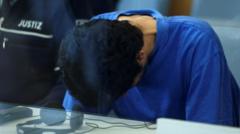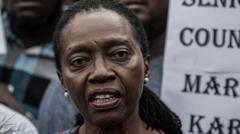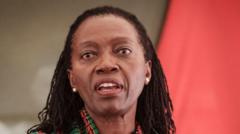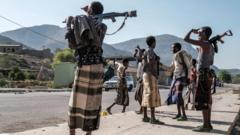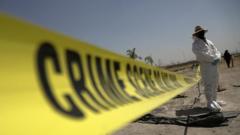Former Prime Minister Sheikh Hasina, once a symbol of Bangladesh's political landscape, now faces serious charges as a special court has issued an arrest warrant regarding her involvement in the deaths of over a thousand protesters during her leadership.
Sheikh Hasina Faces Arrest Warrant Over Protester Deaths in Bangladesh

Sheikh Hasina Faces Arrest Warrant Over Protester Deaths in Bangladesh
A special court issues a warrant for the former Prime Minister over her role in the deadly crackdown on protests amid political turmoil.
In a significant development for Bangladesh, a special court issued an arrest warrant for Sheikh Hasina on June 1, 2025, as she confronts allegations linked to the violent suppression of protests during her regime. This judicial action from the International Crimes Tribunal, which Hasina herself established in 2010 to address historical war crimes, marks a critical shift in accountability efforts. Along with Hasina, several high-ranking officials face charges including incitement, facilitation, and conspiracy concerning the fatal crackdown on demonstrators.
Prosecutors assert that the former leader systematically orchestrated violence against peaceful protestors in July of the previous year before fleeing the country to secure safety in India, where she remains. Despite previous arrests for various charges, this particular case bears the weight of the most severe allegations against her yet.
Political context amplifies this legal matter; currently, the interim administration, led by Muhammad Yunus, a Nobel Laureate, is embroiled in controversies regarding election delays. Opposition parties have pressured the interim government to hold elections by December, but Yunus advocates for a postponement to implement crucial reforms for a fair electoral process.
The recent court proceedings, a historical moment for Bangladesh, were aired live, showcasing a new phase in transparency within the judicial system. However, the absence of all accused from the courtroom underscores the gravity of the situation as the nation grapples with its complex political challenges ahead.
Prosecutors assert that the former leader systematically orchestrated violence against peaceful protestors in July of the previous year before fleeing the country to secure safety in India, where she remains. Despite previous arrests for various charges, this particular case bears the weight of the most severe allegations against her yet.
Political context amplifies this legal matter; currently, the interim administration, led by Muhammad Yunus, a Nobel Laureate, is embroiled in controversies regarding election delays. Opposition parties have pressured the interim government to hold elections by December, but Yunus advocates for a postponement to implement crucial reforms for a fair electoral process.
The recent court proceedings, a historical moment for Bangladesh, were aired live, showcasing a new phase in transparency within the judicial system. However, the absence of all accused from the courtroom underscores the gravity of the situation as the nation grapples with its complex political challenges ahead.





